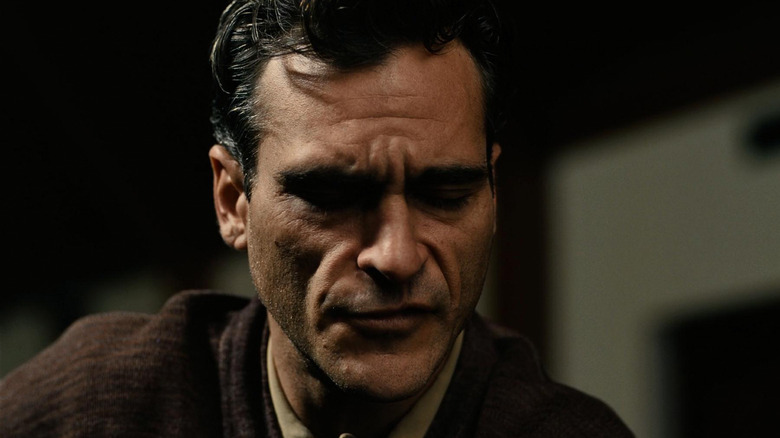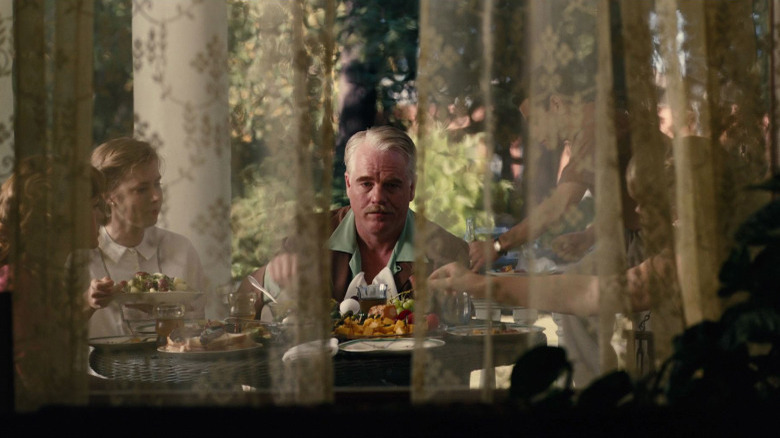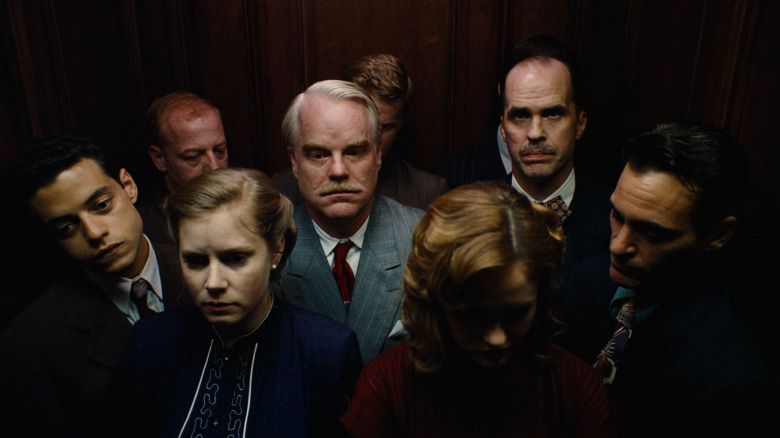The Daily Stream: The Master Finds Paul Thomas Anderson (And America) At A Crossroads
(Welcome to The Daily Stream, an ongoing series in which the /Film team shares what they've been watching, why it's worth checking out, and where you can stream it.)
The Movie: "The Master" (2012)
Where You Can Stream It: MUBI
The Pitch: WWII Navy vet Freddie Quell (Joaquin Phoenix) struggles to find his way in 1950s America, his self-destructive tendencies and unpredictable violent outbursts costing him one job after another. One night, in San Francisco, Freddie crosses paths with Lancaster Dodd (Philip Seymour Hoffman), an authoritative figure who describes himself as "a writer, a doctor, a nuclear physicist, and a theoretical philosopher," but above all else "a hopelessly inquisitive man." He's also the founder and leader of The Cause, a cryptic and often baffling philosophical movement that anyone on the outside looking in can quickly recognize as a cult. Yet, for Freddie, The Cause and, more pointedly, its creator, seem to offer the way forward he's been searching for. Or do they?
Like Dodd, writer/director Paul Thomas Anderson's 2012 film "The Master" could be regarded as very different things depending on how you come at it. One could interpret it as a not-biopic about L. Ron Hubbard in the same way "Blonde" is a not-biopic about Marilyn Monroe, with Dodd being the fictional surrogate for the real-life Church of Scientology founder. It could also be read as a parable about the changing of the Hollywood guard in the mid-20th century, with Dodd representing the old-school generation of actors that included Orson Welles (whom Hoffman cited as an influence on his performance) and Freddie representing their Method-y successors like James Dean and Marlon Brando. Or perhaps "The Master" is a lot of hot air, just as The Cause's non-believers view Dodd as a charlatan spouting hooey.
Personally, I favor a different reading.
Why it's essential viewing
When I first saw "The Master" in theaters 10 years ago, I found it to be an engaging if frustrating enigma, starting with its gorgeous opening shot of sky-blue ocean water being forcibly churned (images of the ocean become a motif packed with deeper meaning as the story progresses). It's a movie as erratic as Freddie, a drifter who chugs his homemade brew of moonshine, ogles every other woman he lays eyes upon, and fiercely assaults anyone who dares to question Dodd and The Cause, even after Freddie himself screams at Dodd, accusing him of "making this s*** up." Phoenix wears his character's trauma in every facial expression or physical movement he makes, to the degree that it becomes painful to watch him at times.
Equally impressive (and unsettling) is Hoffman as Dodd, a domineering fellow who rattles off his nonsense about humans not being mammals and existing in some form for trillions of years with the same unearned confidence of a certain ex-U.S. president. The pair are all too alike in other ways, not least of which is their habit of repeating the same rubbish over and over to their followers — drilling ideas into their heads so as to guarantee their continued, unquestioning loyalty — and crudely slurring or cursing those who dare attempt to expose their lies for what they are. (Suffice it to say, "The Master" has only take on new forms of social relevancy over the last decade.) Together, Freddie and Dodd form a toxic yin-yang, as though they are two sides of the same person made flesh.
'He's making all of this up as he goes along. You don't see that?'
Looking back at it from the present, "The Master" appears to find Anderson the filmmaker at a crossroads between his future and his past, much like America and the characters in the movie. In his ambitious yet unrefined earlier work like "Magnolia," Anderson's idea of great drama too often boiled down to having his actors yell obscenities, scream, or cry loudly, seemingly operating under the belief that "louder" conflict means better conflict. But by the time he made "The Master," his directorial style has grown far more restrained. Gone were his attempts to imitate other directors (namely, Martin Scorsese and Robert Altman) with complex tracking shots or yell-y performances; instead, striking compositions, fewer edits, and subtler acting steadily took their place.
While there are still glimpses of the filmmaker Anderson used to be in "The Master," the movie almost seems like his attempt to keep pushing in the same new direction he went with "There Will Be Blood," rather than zagging again or returning to his former ways. That may also explain why it's a film that often feels like it's a whole lot of ideas in search of greater structure, in the same way its director gives off the impression of an artist trying to figure out where they're even going in their career. Anderson would get there in good time with 2017's "Phantom Thread" (his best movie to date, in my personal opinion), but it's worth watching or revisiting "The Master" just to reflect on his fascinating evolution as a storyteller.


